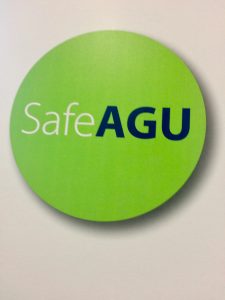December 13, 2017
Missing Voices: Examining Scientific Integrity in the Age of #metoo
Posted by Timia Crisp
Today’s post is part of a series written by student bloggers from the AGU Fall Meeting.
By: Kimberley Rain Miner, University of Maine
Achieving reliable and reproducible data is the core of science, and the integrity of those foundations ensure the longevity of the scientific method. For this reason, that the scientific community is beginning to address the challenges of the past in the interest of maintaining this integrity — especially for women in the field.
More than simple discussions of plagiarism, scientific integrity means making sure that researchers get the appropriate credit for their contributions and that the research is professional and above reproach. Appropriate behavior with students and colleagues is critical, as is the recognition and attribution of the important discoveries to the scientists who made them. This includes appropriate behavior with students and between colleagues, but also implies it is critical that scientists who make relevant discoveries receive the credit.
I think of Jocelyn Bell Burnell, who discovered Pulsars in 1967, but did not receive the Nobel Prize for her work. That honor was given to her male supervisor. Or Chien-Shiung Wu, whose critical work on cobalt-60 won the Nobel in 1957, but was awarded only to her male collaborators. Lise Meitner’s work led to the discovery of nuclear fission, however, when her collaborator and Nobel recipient Otto Hahn attempted to explain how he had discovered it by himself, he was unable — he hadn’t discovered it.
How many additional Nobel Prizes would have been awarded to female physicists and chemists had their voices not been silenced?
This legacy of misawarded Nobel Prizes was ringing in my head when the recent awardees mentioned that women in science “are coming”. Women have been in the sciences, but often their ideas were stolen, or in some cases ignored.
These problems are exactly why the AGU ethics committee recently released a Scientific Integrity and Professional Ethics Policy. They are beginning to address these issues in the hope that the women who have suffered in silence, as their contributions are stolen, ignored or defamed, now have a voice.
The panel on scientific integrity agreed that the culture of the academy must bring out the very best in everyone, and this guidance will help prevent it from bringing out the worst. As the scientist who makes a discovery is the most qualified to report the data, including all voices will increase the strength and breadth of scientific dialogue.
We are at a watershed moment for honesty in science. How we respond and the ethics we uphold will determine the value and future of science. I hope that we all decide to follow in the steps of AGU, advocating for free and open communication, scientific integrity between collaborators and safety in the workplace.
If you are experiencing harassment in the workplace, please know that people care and want to know what is going on. The Chronicle of Higher Education has provided a resource for reporting incidents at [email protected]. Many academic institutions also often have a scientific integrity reporting policy that outlines who to go to in cases of harassment, theft, or unsafe working conditions.

